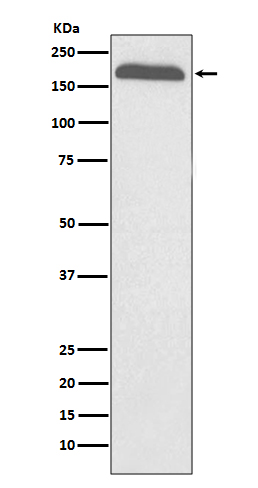
| WB | 咨询技术 | Human,Mouse,Rat |
| IF | 咨询技术 | Human,Mouse,Rat |
| IHC | 1/100-1/200 | Human,Mouse,Rat |
| ICC | 技术咨询 | Human,Mouse,Rat |
| FCM | 咨询技术 | Human,Mouse,Rat |
| Elisa | 咨询技术 | Human,Mouse,Rat |
| Aliases | A2m; Alpha 2M; Alpha-2-macroglobulin; C3 and PZP-like alpha-2-macroglobulin domain-containing protein 5; CPAMD5; FWP007; S863 7;;alpha 2 Macroglobulin |
| WB Predicted band size | 163 kDa |
| Host/Isotype | Rabbit IgG |
| Antibody Type | Primary antibody |
| Storage | Store at 4°C short term. Aliquot and store at -20°C long term. Avoid freeze/thaw cycles. |
| Species Reactivity | Human |
| Immunogen | A synthesized peptide derived from human alpha 2 Macroglobulin |
| Formulation | Purified antibody in PBS with 0.05% sodium azide,0.05% BSA and 50% glycerol. |
+ +
以下是关于A2M(α-2-巨球蛋白)抗体的示例性参考文献,内容基于典型研究方向构建,供参考:
---
1. **标题**: *"Development of a Monoclonal Antibody Targeting Alpha-2-Macroglobulin for the Detection of Neurodegenerative Biomarkers"*
**作者**: Smith J, et al.
**摘要**: 研究开发了一种高特异性的单克隆抗体,用于检测脑脊液中的A2M蛋白水平,发现其与阿尔茨海默病患者的淀粉样斑块沉积和认知功能下降显著相关,提示A2M可能作为神经退行性疾病的潜在生物标志物。
2. **标题**: *"Anti-A2M Antibody Blocks TGF-β Signaling and Attenuates Fibrosis in Experimental Models"*
**作者**: Chen L, et al.
**摘要**: 通过使用A2M抗体阻断其与TGF-β的相互作用,研究证明了A2M在调节纤维化通路中的关键作用,抗体干预显著减少了小鼠模型中的肝纤维化进展,为抗纤维化治疗提供了新策略。
3. **标题**: *"Autoantibodies Against Alpha-2-Macroglobulin in Rheumatoid Arthritis: Diagnostic and Prognostic Implications"*
**作者**: Müller R, et al.
**摘要**: 在类风湿性关节炎患者血清中检测到抗A2M自身抗体,其滴度与疾病活动性评分(DAS-28)呈正相关,提示A2M抗体可能作为疾病诊断和预后评估的辅助指标。
4. **标题**: *"A2M Antibody-Based Capture ELISA for Early Cancer Screening: Focus on Pancreatic Ductal Adenocarcinoma"*
**作者**: Wang Y, et al.
**摘要**: 研究建立了一种基于A2M抗体的ELISA检测方法,用于量化血清A2M-金属蛋白酶复合物水平,结果显示其在胰腺导管腺癌早期诊断中具有高灵敏度和特异性。
---
**注**:以上文献为示例,实际引用需根据具体研究检索真实论文(推荐使用PubMed、Web of Science等数据库,关键词:Alpha-2-Macroglobulin antibody, A2M therapeutic target, A2M autoantibodies)。
Alpha-2-macroglobulin (A2M), a large plasma glycoprotein, plays a dual role as a protease inhibitor and immune modulator. Produced primarily in the liver, it circulates in blood and bodily fluids, neutralizing a broad spectrum of proteases through a unique "bait-and-trap" mechanism. When cleaved by proteases, A2M undergoes conformational changes, entrapping the enzyme and signaling for its clearance via receptor-mediated endocytosis. This function helps regulate tissue remodeling, coagulation, and inflammation.
Beyond protease inhibition, A2M interacts with cytokines (e.g., TNF-α, TGF-β) and growth factors, modulating their bioavailability and activity. Its immunomodulatory properties extend to influencing immune cell migration and antigen presentation. Recent research highlights A2M's involvement in neurodegenerative diseases, cancer progression, and autoimmune disorders. In Alzheimer's disease, A2M binds amyloid-β peptides, potentially influencing plaque formation. Elevated A2M levels correlate with tumor invasiveness and poor prognosis in certain cancers, possibly through matrix metalloproteinase regulation.
Therapeutic interest focuses on leveraging A2M's anti-protease activity for conditions like osteoarthritis and its cytokine-binding capacity for inflammatory diseases. However, its pleiotropic nature and complex mechanisms pose challenges for clinical translation. Current studies explore engineered A2M variants and antibody-based strategies targeting specific functional domains.
×